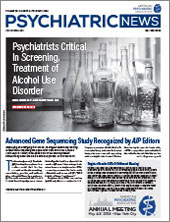Young people with bipolar spectrum disorder who received dialectical behavior therapy (DBT) had significantly fewer suicide attempts compared with young people who received standard psychotherapy, according to a
report published last September in
JAMA Psychiatry. DBT is an evidence-based treatment that focuses on emotional regulation, and one of its uses is for suicidal behavior.
“Up to 50% of youth with bipolar spectrum disorder attempt suicide,” wrote Tina Goldstein, Ph.D., an associate professor of psychiatry at the University of Pittsburgh who studies early onset mood disorders, and colleagues. For up to 60% of individuals, their first suicide attempt is lethal, and for those who survive, the risk of death increases with each successive attempt. “Thus, the capacity to predict first attempt among youth with [bipolar spectrum disorder] and provide a potentially preventive intervention like DBT offers a compelling future direction.”
The study involved adolescents aged 12 to 18 years diagnosed with bipolar spectrum disorder who were recruited from a specialty outpatient psychiatric clinic at the University of Pittsburgh Medical Center between November 2014 and September 2019. Forty-seven were randomized to receive 37 sessions of DBT over one year, and 53 were randomized to receive standard psychotherapy (for example, sessions focused on cognitive strategies and behavioral approaches). All youth received medication from study psychiatrists according to a treatment algorithm. By the study’s end, 28 youth had withdrawn from the study, and eight were lost to follow-up.
Primary outcomes included suicide attempts over one year and mood symptoms and episodes of depression and hypomania/mania. Suicide attempts were assessed using the Columbia Suicide Severity Rating Scale and the ALIFE Self-Injurious/Suicidal Behavior Scale. The researchers also assessed emotional regulation using the self-reported Difficulties With Emotion Regulation Scale.
Over the year-long study, youth who had received DBT reported significantly fewer suicide attempts compared with those who had received standard psychotherapy.
“[S]uicide attempts declined to a greater extent over time among those receiving DBT compared with those receiving [standard] psychotherapy, particularly among participants with a recent and/or lifetime history of suicide attempt,” the authors noted.
While the groups displayed similar improvements in symptoms of depression and episodes of hypomania and mania, those who received DBT experienced greater improvement in emotional regulation. Improvement in emotional regulation was associated with decreased suicide risk, particularly among those with high baseline emotion dysregulation.
The authors concluded, “Adolescents with bipolar disorder at elevated risk of suicidal behavior and those exhibiting high emotion dysregulation stand to benefit most from DBT’s effects on decreasing suicide attempt risk through enhancing emotion regulation.”
Child and adolescent psychiatrist Blaise Aguirre, M.D., who reviewed the report for Psychiatric News, said that it is not surprising that the benefits of DBT can be extended to youth with bipolar disorder. He is an assistant professor of psychiatry at Harvard Medical School and the Michael Hollander, Ph.D., Endowed Director of 3East Continuum, a DBT treatment program for teenagers and young adults at McLean Hospital.
“We have treated more than 5,000 adolescents with severe suicidality, and some have comorbid bipolar,” he said. “I have not done research on bipolar specifically, but anecdotally the skills taught in DBT have a degree of universality that includes benefiting patients with bipolar disorder.”
Aguirre wondered, however, whether some of the study cohort may have had comorbid borderline personality disorder; on inpatient units, up to 40% of patients with bipolar disorder also have a diagnosis of borderline personality disorder, he said.
He pointed out that DBT therapy can help patients identify, label, and better manage triggers that may lead to depression, anxiety, and suicidal thinking. “Where DBT has its greatest impact is with people with disorders of emotional regulation,” he told Psychiatric News. “But the core skill of DBT is mindfulness. It’s impossible to regulate anger or sadness if you don’t pay attention to what it is. What DBT does is to insist on targeting, naming, and labeling those emotions.”
Aguirre recently returned from Singapore where he taught mental health professionals the principles of DBT.
“Although DBT was well known to the psychologists, it was not well known to the psychiatrists,” he said. “Once I had completed the training, the psychiatrists concluded that they were less afraid to treat suicidal adolescents and that the skills and application of DBT would make their lives easier because they could rely on an evidence-based methodology that specifically targets suicidal behavior.”

